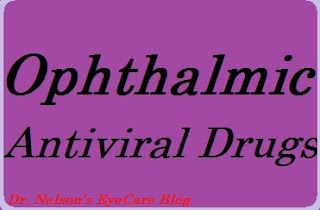Ocular viral infections have become a major cause of corneal
blindness in the developed as well as developing countries.
Viruses do not only take nutrition from their hostcell but
also direct its metabolic machinery to synthesize new virus particles. Viral
chemotherapy is therefore difficulty as it would require interference with
cellular metabolism in the host.
Development of antiviral drugs has lagged behind unlike the rapid development of antibacterial antibiotics because it is difficult to block the viral activity in the cell without adversely affecting the host cell metabolic activity since virus replicates using host cell machinery. Most of the antiviral drugs available today mainly disrupt viral DNA synthesis without unduly harming the host cells. Some of the ophthalmic antiviral drugs include the following.
IDOXURIDINE (IDU); it is effective in the treatment of
herpes simplex keratitis and is contraindicated during the first few weeks of
keratoplasty and penetrating corneal ulcer as it inhibits corneal stromal
healing. IDU is commercially available as 0.1% solution and 0.5% ointment.
To administer the drug, instill one drop of the solution
every hour during the day and every two to three hours at night. Ointments can
be applied four to six times a day. Treatment should not be prolonged beyond
three weeks since it may lead to corneal toxicity.
TRIFLURIDINE (VIROPTIC). It is more soluble than IDU and is
effective against IDU resistant strains. Viroptic is only available for topical
use and is not used systemically. It is used in the treatment of;
- Primary and recurrent herpes simplex (HSV) epithelial keratitis, vaccinia and adeno virus keratitis.
- Dendritic and geographical HSV keratitis.
- Deeper viral infections of the eye (especially stromal involvement).
- IDU and Vidarabine resistant cases.
- Superficial punctuate keratitis.
It is available as 1% topical solution and the patient is
advised to instill one drop six to nine times daily for fourteen days and then
four times daily for one week after corneal epithelization (ulcer heals). It
does not penetrate the intact cornea but in the diseased eye, it attains
antiviral concentration in the aqueous humor.
VIDARABINE (Ara-A or Vira-A); It is only available as 3.0%
ointment for topical use because systemic use has been discontinued due to
availability of better and safe drugs. Ara-A is indicated in epithelial
keratitis caused by herpes simplex virus and acute keratoconjunctivitis. It is
applied five times daily for fourteen to twenty one days and then reduced to
one to two times daily for four to five days after epithelization. Generally,
treatment should not be prolonged beyond three weeks due to fear of toxicity.
Similar ointment to Vira-A is Cytarabine which is available as 1% ointment.
BROMOVINYL DEOXYURIDINE (BVDU); It is more potent than IDU
in healing epithelial HSV keratitis and better to viroptic in the treatment of
viral stromal keratitis and iritiis. It penetrates easily through the intact
cornea to attain viricidal concentration in the aqueous humor. BVDU is
available as 0.1% ophthalmic solution. Patient is advised to instill one to two
drops eight to nine times daily (All cornea ulcers should heal within eight to
ten days). It has good effect in dendritic ulcer and stromal keratitis.
ACYCLOVIR; Acyclovir is a potent anti-herpetic drug with
minimal side effects. This is because the normal cellular function is
unaffected while the virus replication is inhibited in the virus infected
cells.
It is active against HSV and varicella zoster virus (VZV).
Acyclovir is available as 0.3% ointment and 200, 400 and 800mg oral tablets.
The ointment is applied five times daily for four days and then one to two
times daily while the 200-800mg is given five times daily for ten days. It is
also available as intravenous injections.
FOSCARNET; Foscarnet is active against acyclovir resistant herpes virus and ganciclovir resistant cytomegalovirus retinitis. It is indicated in the following eye conditions;
- Treatment of cytomegalovirus retinitis (CMV) in AIDS patients.
- Treatment of acyclovir resistant herpes simplex keratitis (HSV infections).
- Treatment of ganciclovir and cidofovir resistant CMV retinitis.
- In combination with ganciclovir, it is used in patient with relapse after monotherapy with either drug.
Commercially, foscarnet is available as 24mg/ml intravenous
infusion. For CMV retinitis, infuse 60mg/kg slowly over one hour three times
daily for two to three weeks and then 90mg/kg daily over two hours.
For resistant HSV keratitis, infuse 40mg/kg slowly over one
hour two to three times daily until ulcer heals then 90mg/kg daily over two
hours.
CIDAFOVIR; It is active against CMV, HSV, VZV, Epstein-Barr
virus (EBV), Adno virus and Pox virus. It is indicated in the treatment of CMV
retinitis in AIDS patients. Cidofovir is commercially available as 75mg/ml
injection and must be diluted in 100ml 0.9% saline solution prior to the
administration. Recommended dose of cidofovir for 5mg/kg is once weekly as slow
IV infusion over one hour for two weeks followed by maintenance dose of 5mg/kg
IV infusion once in every two weeks. Probenecid should be given orally with
each cidofovir dose to minimize potential nephrotoxicity.
Other examples of antiviral drugs are; interferons,
ganciclovir, amciclovir, zidovudine, lobucavir, indinavir, ritonavir,
valaciclovir, etc.


It's impressive that you are getting ideas from this piece of writing as well as from our discussion made at this time.
ReplyDeleteWhat's up mates, fastidious post and pleasant
ReplyDeleteurging commented here, I am actually enjoying by these.
This information is priceless. How can I find out more?
ReplyDeleteExcellent web site you have got here.. It's difficult to find
ReplyDeletegood quality writing like yours these days. I honestly appreciate people like you!
Take care!!
Hi, this weekend is fastidious in support of me, as this
ReplyDeleteoccasion i am reading this enormous educational paragraph here at my house.
Hi there, sight medical blog uses a free host from Google blogger.
ReplyDeleteVery good post. I certainly appreciate this site. Keep it up!
ReplyDeleteHey very nice blog!
ReplyDelete